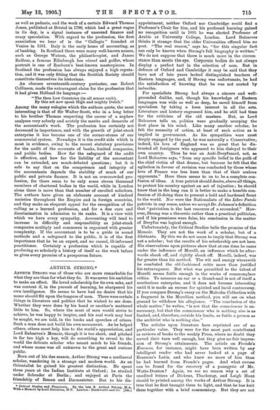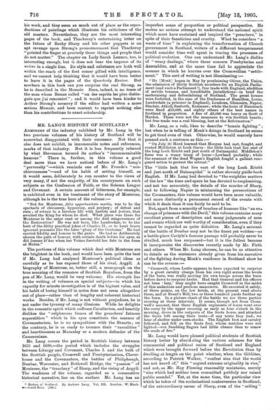ARTHUR STRONG was of those who are more remarkable for
what they are than for what they do. It was never his ambition to make an effect. He loved scholarship for its own sake, and was content if, in the pursuit of learning, he sharpened his own intelligence. He seems to have had no desire that his name should flit upon the tongues of men. There were certain things in literature and politics that he wished to see done. Whether they were done by his hand or another's mattered little to him. So, where the most of men would strive to achieve, he was happy to inspire, and his real work may best be sought, we are told, in the books and speeches of others. Such a man does not build his own monument. As he helped others, others must help him to the world's appreciation, and Lord Balcarrea's Memoir, though it is too short, and pitched in far too high a key, will do something to reveal to the world the delicate scholar who meant much to his friends, and whose name was all unknown to the great and curious public.
Born out of his due season, Arthur Strong was a mediaeval scholar, wandering in a strange and modern world. As an Orientalist he gained his greatest distinction. He spent three years at the Indian Institute at Oxford ; he studied under Schrader at Berlin ; and enjoyed at Paris the friendship of Renan and Darmesteter. But to his die-
* Critical Studios and Fragments. By the late S. Arthur Strong, M.A. With a Memoir by Lord Baloarres, M.P. London: Duckworth and Co. Deal
appointment, neither Oxford nor Cambridge could find a Professor's Chair for him, and his profound learning gained no recognition until in 1895 he was elected Professor of Arabic at University College, London. Lord Balcarres thinks it strange that the older Universities offered him no post. "The real reason," says he, "for this singular fact can only be known when Strong's full biography is written." We do not suppose that there is much more in the circum
stance than meets the eye. Corporate bodies do not always
display a perfect tact in the selection of men. But in defence of Oxford and Cambridge it may be said that they have not of late years lacked distinguished teachers of Eastern languages, and, if Strong was unfortunate, he had the satisfaction of knowing that he was not ousted by imbeciles.
For specialists Strong had always a sincere and well- grounded dislike, and, though his knowledge of Eastern languages was wide as well as deep, he saved himself from specialism by taking a keen interest in all the arts. Literature and history engrossed him, and he still had time for the criticism of the old masters. But, as Lord Balcarres tells us, politics were gradually usurping the first place in his mind. Like many another scholar, he felt the necessity of action, at least of such action as is implied in government. As his sympathies were most deeply engaged by the past, he was naturally a Conservative; indeed, his love of England was so great that he dis- trusted all foreigners who appeared to him disloyal to their own country. Thus he was an Anti-Dreyfusard, not, as Lord Balcarres says, "from any specific belief in the guilt of the chief victim of that drama, but because he felt that the agitation in favour of revision was conducted by those whose love of France was less keen than that of their zealous opponents." Here there seems to us to be a complete con- fusion of ideas. A true patriot should desire, above all things, to protect his country against an act of injustice ; he should know that in the long run it is better to make a humble con- fession of ill-doing than to present a bold and hardened front to the world. Nor were the Nationalists of the Libre Parole patriots in any sense, unless we accept Dr. Johnson's definition that "patriotism is the last resource of a scoundrel." How- ever, Strong was a theoretic rather than a practical politician, and if his premisses were false, his conclusion in the matter of Dreyfus was logical enough.
Unfortunately, the Critical Studies belie the promise of the Memoir. They are not the work of a scholar, but of a dilettante. By this we do not mean to imply that Strong was not a scholar; but the results of his scholarship are not here. His observations upon pictures show that at one time he came under the influence of Morelli, an influence which he after- wards shook off, and rightly shook off. Morelli, indeed, was far greater than his method. The wit and energy wherewith he combated the old-fashioned critic more than justified his extravagance. But what was permitted to the talent of Morelli seems futile enough in the works of commonplace critics. To measure an ear or a thumb-nail is not of itself a meritorious enterprise, and it does not become interesting until it is made an excuse for spirited and lucid controversy. If you compare Strong's essay on the Malcolm Collection with a fragment in the Morellian method, you will see on what ground he withdrew his allegiance. "The conclusion of the whole matter," he writes, "is not that the connoisseur is un- necessary, but that the connoisseur who is nothing else is as limited, and, therefore, outside his limits, as futile a person as the archivist who is nothing else."
The articles upon literature here reprinted are of no particular value. They were for the most part contributed as reviews of books to the weekly Press, where no doubt they served their turn well enough, but they give no fair impres- sion of Strong's attainments. The article on Froude's Erasmus, for instance, might have been written by any intelligent reader who had never looked at a page of Erasmus's Latin, and who knew no more of him than he had learned from Fronde's pages. And what excuse can be found for the recovery of a panegyric of Mr. Watts-Dunton P Again, we see no reason why a set of
unedited letters of Dickens, Thackeray, and Leigh Hunt should be printed among the works of Arthur Strong. It is true that he first brought them to light, and that he has knit them together with a brief commentary. But they are not
Ins work, and they seem as much out of place as the repro- ductions of paintings which illustrate his criticisms of the old masters. Nevertheless, they are the most interesting pages of the book, and Thackeray's entertaining letter on the future of Becky Sharp and his other puppets is an apt revenge upon Strong's pronouncement that Thackeray "pointed the finger at precisely those things and people that do not matter." The chapter on Lady Sarah Lennox, too, is interesting enough, but it does not bear the impress of its writer in a single line. Its style and substance are both well within the reach of the first corner gifted with intelligence, and we cannot help thinking that it would have been better to leave it in the pages of the Quarterly Review. But nowhere in this book can you surprise the real Strong, as he is described in the Memoir. Here, indeed, is no trace of the man whom Henan called " un des esprita lea plus distin- gigs que j'ai rencontro " ; and it would have been kinder to Arthur Strong's memory if the editor had written a more serious Memoir, and been content to reprint nothing else than his contributions to exact scholarship.







































 Previous page
Previous page